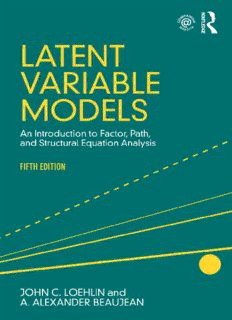
Latent Variable Models: An Introduction to Factor, Path, and Structural Equation Analysis PDF
Preview Latent Variable Models: An Introduction to Factor, Path, and Structural Equation Analysis
Latent Variable Models An Introduction to Factor, Path, and Structural Equation Analysis FifthEdition LatentVariableModels: AnIntroductiontoFactor,Path,andStructuralEquation Analysisintroduceslatentvariablemodelsbyutilizingpathdiagramstoexplainthe relationshipsinthemodels. Thisapproachhelpslessmathematically-inclinedreaders tograsptheunderlyingrelationsamongpathanalysis,factoranalysis,andstructural equationmodeling,andtosetupandcarryoutsuchanalyses. Thisrevisedandexpandedfiftheditionagaincontainskeychaptersonpathanalysis, structuralequationmodels,andexploratoryfactoranalysis. Inaddition,itcontainsnew materialoncompositereliability,modelswithcategoricaldata,theminimumaverage partialprocedure,bi-factormodels,andcommunicatingaboutlatentvariablemodels. Theinformalwritingstyleandthenumerousillustrativeexamplesmakethebook accessibletoreadersofvaryingbackgrounds. Notesattheendofeachchapter expandthediscussionandprovideadditionaltechnicaldetailandreferences. Moreover,mostchapterscontainanextendedexampleinwhichtheauthorswork throughoneofthechapter’sexamplesindetailtoaidreadersinconductingsimilar analyseswiththeirowndata. Thebookandaccompanyingwebsiteprovideallofthe dataforthebook’sexamplesaswellassyntaxfromlatentvariableprogramsso readerscanreplicatetheanalyses. Thebookcanbeusedwithanyofavarietyof computerprograms,butspecialattentionispaidtoLISRELandR. Animportantresourceforadvancedstudentsandresearchersinnumerousdisciplines inthebehavioralsciences,education,business,andhealthsciences,LatentVariable Modelsisapracticalandreadablereferenceforthoseseekingtounderstandor conductananalysisusinglatentvariables. JohnC.LoehlinisProfessorEmeritusofPsychologyandComputerScienceatthe UniversityofTexasatAustin. HereceivedhisPhDinPsychologyfromtheUniversity ofCalifornia(Berkeley). A.AlexanderBeaujeanisanAssociateProfessorofEducationalPsychologyat BaylorUniversity. HereceivedPhDsinEducationalPsychologyandSchool PsychologyfromtheUniversityofMissouri. This page intentionally left blank Latent Variable Models An Introduction to Factor, Path, and Structural Equation Analysis FifthEdition JohnC.Loehlin A.AlexanderBeaujean RO Routledge U TLED Taylor & Francis Group G E LONDON AND NEW YORK Firstpublished2017 byRoutledge 711ThirdAvenue,NewYork,NY10017 andbyRoutledge 2ParkSquare,MiltonPark,Abingdon,Oxon,OX144RN RoutledgeisanimprintoftheTaylor&FrancisGroup,aninformabusiness ©2017Taylor&Francis TherightofJohnC.LoehlinandA.AlexanderBeaujeantobeidentifiedasauthorofthisworkhasbeen assertedbytheminaccordancewithsections77and78oftheCopyright,DesignsandPatentsAct1988. Allrightsreserved.Nopartofthisbookmaybereprintedorreproduced orutilisedinanyformorbyanyelectronic,mechanical,orothermeans, nowknownorhereafterinvented,includingphotocopyingandrecording, orinanyinformationstorageorretrievalsystem,withoutpermissioninwritingfromthepublishers. Publisher’sNote Thisbookhasbeenpreparedfromcamera-readycopyprovidedbytheauthors. Trademarknotice:Productorcorporatenamesmaybetrademarksorregisteredtrademarks,andareused onlyforidentificationandexplanationwithoutintenttoinfringe. LibraryofCongressCataloginginPublicationData Names:Loehlin,JohnC.|Beaujean,A.Alexander. Title:Latentvariablemodels:anintroductiontofactor,path,andstructuralequationanalysis. Description:Fifthedition/JohnC.Loehlin,A.AlexanderBeaujean.|NewYork,NY:Routledge,2017.| Includesbibliographicalreferencesandindex. Identifiers:LCCN2016038052|ISBN9781138916067(hb:alk.paper)| ISBN9781138916074(pb:alk.paper)|ISBN9781315643199(epub) Subjects:LCSH:Latentvariables.|Latentstructureanalysis.|Factoranalysis.| Pathanalysis(Statistics)|Structuralequationmodeling. Classification:LCCQA278.6.L642017|DDC519.5/35–dc23 LCrecordavailableathttps://lccn.loc.gov/2016038052 ISBN:978-1-138-91606-7(hbk) ISBN:978-1-138-91607-4(pbk) ISBN:978-1-315-64319-9(ebk) TypesetinHelvetica byJohnC.LoehlinandA.AlexanderBeaujean Visitthecompanionwebsite:routledge.com/cw/loehlin Contents Preface ix Chapter1: PathModelsinFactor,Path,andStructuralEquation Analysis 1 PathDiagrams 2 PathAnalysis 7 FactorModels 16 StructuralEquations 23 OriginalandStandardizedVariables 24 ManifestVersusLatentVariableModels 28 ExtendedExample 28 Notes 31 Exercises 33 Chapter2: FittingPathModels 37 IterativeSolutionofPathEquations 37 MatrixFormulationofPathModels 42 Full-FledgedModel-FittingPrograms 46 FitFunctions 54 2 Hierarchicalffl Tests 63 DescriptiveCriteriaofModelFit 69 ThePowertoRejectanIncorrectModel 72 Identification 76 MissingData 78 CorrelationsVersusCovariancesinModelFitting 82 ExtendedExample 84 Notes 86 Exercises 91 Chapter3: FittingPathandStructuralModelstoDatafromaSingle GrouponaSingleOccasion 95 StructuralandMeasurementModels 95 ConfirmatoryFactorAnalysis 100 SomePsychometricApplicationsofPathandStructuralModels 103 StructuralModels—ControllingExtraneousVariables 111 ModelswithReciprocalInfluencesandCorrelatedErrors 115 NonlinearEffectsAmongLatentVariables 120 ExtendedExample 124 v Notes 126 Exercises 129 Chapter4: FittingModelsInvolvingRepeatedMeasures,Multiple Groups,orMeans 133 ModelsofEventsOverTime 133 ModelsComparingDifferentGroups 142 FittingModelstoMeansaswellasCovariances 151 TheVersatilityofMultiple-GroupDesigns 159 ModelswithCategoricalIndicators 160 AConcludingComment 163 ExtendedExample 163 Notes 166 Exercises 169 Chapter5: ExploratoryFactorAnalysis—Basics 171 FactorExtraction 174 EstimatingCommunalities 179 DeterminingtheNumberofFactors 183 Rotation 189 AnExample: Thurstone’sBoxProblem 197 FactorAnalysisUsingPackagedPrograms 201 ExtendedExample 204 Notes 205 Exercises 208 Chapter6: ExploratoryFactorAnalysis—Elaborations 211 Rescalings—AlphaandCanonicalFactors 211 AlternativeStoppingCriteria 214 AlternativeRotationMethods 217 EstimatingFactorScores 220 HierarchicalFactors 225 NonlinearFactorAnalysis 232 ExtendedExample 235 Notes 240 Exercises 241 Chapter7: IssuesintheApplicationofLatentVariableModels 243 ExploratoryModificationofaModel 243 AlternativeModels 248 CanPathDiagramsbeConstructedAutomatically? 252 ModesofLatentVariableAnalysis 255 AdvancedTopicsinLatentVariableModels 260 CriticismsofLatentVariableModeling 263 vi Notes 268 Exercises 271 Appendices 273 A. SimpleMatrixOperations 273 B. DerivationofMatrixVersionofPathEquations 281 C. LISRELMatricesandExamples 284 D. ModelFitIndices 289 E. TableofChi-squareValues 299 F. NoncentralChi-squareValuesforEstimatingPower 301 G. PowerofaTestofPoorFitandSampleSizesNeededforPower 303 H. CommunicatingAboutLatentVariableModels 305 AnswerstoExercises 309 References 321 Index 367 vii This page intentionally left blank Preface to the First Edition Thisbookisintendedasanintroductiontoanexcitinggrowthareainsocialscience methodology—theuseofmultiple-latent-variablemodels. Psychologistsandother socialscientistshavelongbeenfamiliarwithonesubvarietyofsuchmodeling,factor analysis—moreproperly,exploratoryfactoranalysis. Inrecentdecades,confirmatory factoranalysis,pathanalysis,andstructuralequationmodelinghavecomeoutof specializednichesandaremakingtheirbidtobecomebasictoolsintheresearch repertoireofthesocialscientist,particularlytheonewhoisforcedtodealwithcomplex real-lifephenomenaintheround: thesociologist,thepoliticalscientist,thesocial, educational,clinical,industrial,personalityordevelopmentalpsychologist,the marketingresearcher,andthelike. Allthesemethodsareatheartone,asIhavetriedtoemphasizeinthechaptersto follow. Ihaveusedearlierversionsofthisbookinteachinggraduatestudentsfrom psychologyandrelateddisciplines,andhavefoundtheparticularapproachused—via pathdiagrams—tobeeffectiveinhelpingnot-too-mathematicalstudentsgrasp underlyingrelationships,asopposedtomerelygoingthroughthemotionsofrunning computerprograms. Insomesectionsofthebookacertainamountofelementary matrixalgebraisemployed;anappendixonthetopicisprovidedforthosewhomay needhelphere. Intheinterestsofaccessibility,Ihavetriedtomaintainarelativelyinformalstyle, andtokeepthemaintextfairlyunclutteredwithreferences. Thenotesattheendof eachchapterareintendedloprovidetheseriousstudentwithapathintothetechnical literature,aswellastodrawhisorherattentiontosomeissuesbeyondthescopeof thebasictreatment. Thebookisnotcloselytiedtoaparticularcomputerprogramorpackage,although thereissomespecialattentionpaidtoLISREL.Iassumethatmostuserswillhave accesstoalatent-variablemodel-fittingprogramontheorderofLISREL,COSAN, EQS,orMILS,andanexploratoryfactoranalysispackagesuchasthoseinSPSS, BMDP,orSAS.Insomeplaces,amatrixmanipulationfacilitysuchasthatinMINITAB orSASwouldbehelpful. Ihaveprovidedsomeintroductorymaterialbuthavenottried totellstudentsalltheyneedtoknowtorunactualprograms—suchinformationisoften local,ephemeral,orboth. Theinstructorshouldexpecttoprovidesomehandoutsand perhapsabitofhands-onassistanceingettingstudentsstarted. Thereadergoingit onhisorherownwillrequireaccesstocurrentmanualsforthecomputerprogramsto beused. ix
Description: